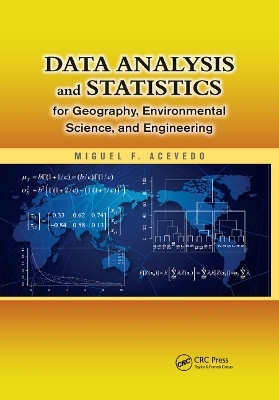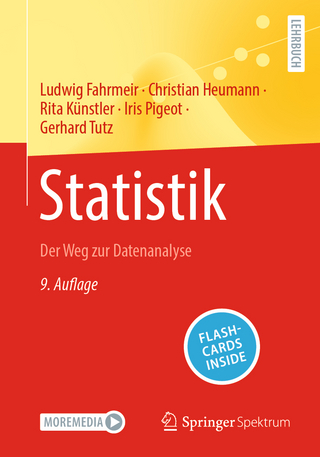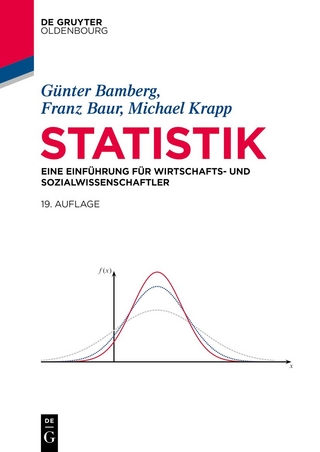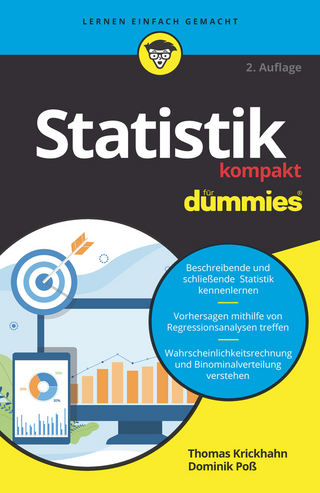
Data Analysis and Statistics for Geography, Environmental Science, and Engineering
CRC Press (Verlag)
978-0-367-86679-2 (ISBN)
Providing a solid foundation for twenty-first-century scientists and engineers, Data Analysis and Statistics for Geography, Environmental Science, and Engineering guides readers in learning quantitative methodology, including how to implement data analysis methods using open-source software. Given the importance of interdisciplinary work in sustainability, the book brings together principles of statistics and probability, multivariate analysis, and spatial analysis methods applicable across a variety of science and engineering disciplines.
Learn How to Use a Variety of Data Analysis and Statistics Methods
Based on the author’s many years of teaching graduate and undergraduate students, this textbook emphasizes hands-on learning. Organized into two parts, it allows greater flexibility using the material in various countries and types of curricula. The first part covers probability, random variables and inferential statistics, applications of regression, time series analysis, and analysis of spatial point patterns. The second part uses matrix algebra to address multidimensional problems. After a review of matrices, it delves into multiple regression, dependent random processes and autoregressive time series, spatial analysis using geostatistics and spatial regression, discriminant analysis, and a variety of multivariate analyses based on eigenvector methods.
Build from Fundamental Concepts to Effective Problem Solving
Each chapter starts with conceptual and theoretical material to give a firm foundation in how the methods work. Examples and exercises illustrate the applications and demonstrate how to go from concepts to problem solving. Hands-on computer sessions allow students to grasp the practical implications and learn by doing. Throughout, the computer examples and exercises use seeg and RcmdrPlugin.seeg, open-source R packages developed by th
Miguel F. Acevedo has 38 years of academic experience, the last 20 of these as faculty member of the University of North Texas (UNT). His career has been interdisciplinary, especially at the interface of science and engineering. He obtained his Ph.D. in biophysics from the University of California Berkeley and master's degrees in electrical engineering and computer science from Berkeley and the University of Texas at Austin, respectively. Prior to UNT, he was at the Universidad de Los Andes in Merida, Venezuela, where he taught for 18 years. He has served on the Science Advisory Board of the U.S. Environmental Protection Agency and on many review panels of the U.S. National Science Foundation. He has received numerous research grants and written many journal articles, book chapters, and proceedings articles. UNT has recognized him with the Regent’s Professor rank, the Citation for Distinguished Service to International Education, and the Regent’s Faculty Lectureship. For more information, see Dr. Acevedo’s page at UNT.
Part I Introduction to Probability, Statistics, Time Series, and Spatial Analysis: Introduction. Probability Theory. Random Variables, Distributions, Moments, and Statistics. Exploratory Analysis and Introduction to Inferential Statistics. More on Inferential Statistics: Goodness of Fit, Contingency Analysis, and Analysis of Variance. Regression. Stochastic or Random Processes and Time Series. Spatial Point Patterns. Part II Matrices, Tempral and Spatial Autoregressive Processes, and Multivariate Analysis: Matrices and Linear Algebra. Multivariate Models. Dependent Stochastic Processes and Time Series. Geostatistics: Kriging. Spatial Auto-Correlation and Auto-Regression. Multivariate Analysis I: Reducing Dimensionality. Multivariate Analysis II: Identifying and Developing Relationships among Observations and Variables. Bibliography. Index.
| Erscheinungsdatum | 23.12.2019 |
|---|---|
| Verlagsort | London |
| Sprache | englisch |
| Maße | 178 x 254 mm |
| Gewicht | 1040 g |
| Themenwelt | Mathematik / Informatik ► Mathematik ► Statistik |
| Naturwissenschaften ► Geowissenschaften ► Geografie / Kartografie | |
| Technik ► Umwelttechnik / Biotechnologie | |
| ISBN-10 | 0-367-86679-X / 036786679X |
| ISBN-13 | 978-0-367-86679-2 / 9780367866792 |
| Zustand | Neuware |
| Haben Sie eine Frage zum Produkt? |
aus dem Bereich


